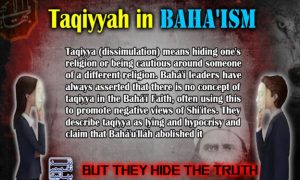Taqiyya, or dissimulation, is often misunderstood in the context of the Bahá’í Faith. Contrary to popular belief, Baha’u’llah not only did not abolish taqiyya but actually commanded its practice, a directive further reinforced by ‘Abdu’l-Bahá. It wasn’t until Shoghi Effendi that the first ban on taqiyya was introduced, raising questions about the authority behind this decision.
Taqiyyah in Baha’ism
Taqiyya (dissimulation) means hiding one’s religion or being cautious around someone of a different religion.Bahá’í leaders have always assertedthat there is no concept of taqiyya in the Bahá’í Faith, often using this to promote negative views of Shi’ites. They point to the testimonies of the killed followers of the Báb and Bahá’u’lláh, arguing that if these followers had practiced taqiyya, they would not have been killed in such numbers. They describe taqiyya as lying and hypocrisy and claim that Bahá’u’lláh abolished it.
In this brief article, we do not aim to inspect the concept of Taqiyya and its conditions. Instead, by referring to various authentic Bahai sources, we will show that not only Bahá’u’lláhdid not abolish taqiyya, but he also commanded its practice. There is no evidence that Bahá’u’lláh ever revoked taqiyya. After Bahá’u’lláh, Abdul-Baháalso instructed the followers to adhere to taqiyya as ordered by his father. However, the first order banning taqiyya came from Shoghi, but whether he had the authority to do this is not discussed in this article.
In the following sections, we are going to examine the words of Bahá’u’lláh, Abdul-Bahá, and Shoghi with regards to Taqiyyah. Section one brings the references to Bahá’u’lláh’s words that he encourages his followers to practice taqiyya. Section two inspects the words of Abdul-Bahá in asking his followers to do the same. Section three provides some letters from Shoghi that he has banned taqiyya. Throughout each section, we first bring a reference from the Baha’i leader, and then provide a detail examination of the text.
Section one: Bahá’u’lláh’sInstruction on Taqiyya
The first document
Bahá’u’lláhin his tablet Order and Creation, volume 3, pages 118-119 talks about the importance oftaqiyya. He emphasis that practicing taqiyya protects the lives of believers.
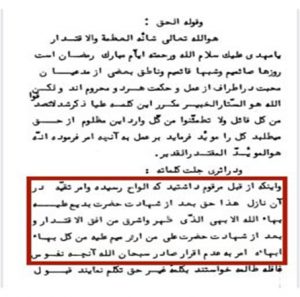
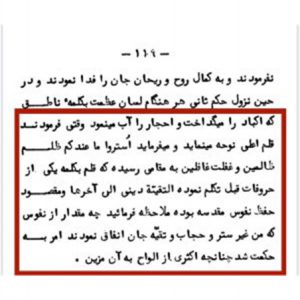
Here is the translation of the above tablet:
“And you had previously stated that tablets had received and the order of taqiyya had been revealed in them; this is the truth!
After the martyrdom of Hazrat Badi’ (۱۲۸۶ AH) upon Him be the peace of Allah…and after the martyrdom of Hazrat Ali (Mulla Ali Mahfurozki) in Mazandaran; the command of hiding one’s religion (i.e., the command of taqiyya) was issued. Glory be to Allah, whatever the heedless and unjust souls (of those two) desired to speak falsehood with a word other than the truth (to say we are not the Babis), was not accepted and … (Allah) says “Conceal that which ye possess”.
The oppression of the oppressors and the ignorance of the ignorant has reached a point where the Pen (Bahá’u’lláh) has spoken with a word from one of the previous letters (Imam Muhammad al-Taqi) –Taqiyya is my religion- and the purpose (of Taqiyya) is to protect the sanctified soul.
Note that a considerable number of souls lost their lives due to lack of covering, concealment, and dissimulation. It was commanded to act according to wisdom, as adorned in most of the Tablets regarding observance of wisdom.”
Key Points Derived from this Passage:
- Bahá’u’lláh has commanded dissimulation, basing this action on the sayings of the Imams of Shi’ites.
- Wisdom and dissimulation are considered synonymous and are used interchangeably.
- Bahá’u’lláh has explained the philosophy of dissimulation for the protection of the believers’ lives.
- Bahá’u’lláh condemns those who do not practice dissimulation as being heedless.
- Bahá’u’lláh states that he has commanded dissimulation in most of the Tablets.
The second document
Kamran Iqbal, quoting the Bahá’í magazine Payam Bahá’í, Issue 307 (June 2005), pages 43-44, presents a tablet from Bahá’u’lláh addressed to Aqa Seyyed Khalil. A portion of this tablet is as follows:
“O My Name! All those who have entered prison in the path of God, and those who have become agitated, distressed, and dispersed out of fear of oppressors, have all attained the mention of the Most Exalted Pen!
The people of ‘Mim’ have faced calamities the likes of which have never been heard in the world. By God’s life, this oppression will cause widespread corruption and discord in the world… Protect yourself and be among those who conceal [their faith].
The wickedness of the servants has reached such a level that the Most Exalted Pen laments and wails, for it has spoken in the words of the saints of the past: ‘Conceal your gold, your travels, and your beliefs,’ and ‘Taqiyya (dissimulation) is my religion and the religion of my ancestors.’
After the death of Badí‘ (may divine mercy be upon him), a firm ruling of wisdom was revealed in the divine book, meaning it was clearly and explicitly stated; similarly, after the death of Mulla Ali, the ruling of concealment was revealed: no one has the right to declare this matter [i.e., the Bahá’í Faith] in front of others.“
The points derived from this tablet are:
- The command for taqiyya(dissimulation) with the phrase Protect yourself… Be among those who conceal [their faith].
- A repeated command for taqiyya, referring to the words of the religious leaders and saints: Conceal your gold, your travels, and your beliefs. (This phrase comes from the elders of Sufism and mysticism and has been mentioned in some Shi’a sources, attributed to the Prophet Muhammad, though similar sentiments are found in Shi’a hadiths.)
- The synonymous nature of wisdom and taqiyya.
- The explicit ruling for taqiyyawith the phrase No one has the right… No one has the right to declare their Bahá’í faith in front of others.
- With this ruling, the possibility of interpretation and exegesis has been removed from the Bahá’ís!
The third document
The article “Review of the tablets of Baha’u’llah addressed to Muhammad Mustafa Baghdadi” written by Kamran Iqbal, included in Safina Irfan, book 4, page 192-202, highlights the fact that Bahullah commanded his followers to practice taqiyya. Below is that portion of the article.
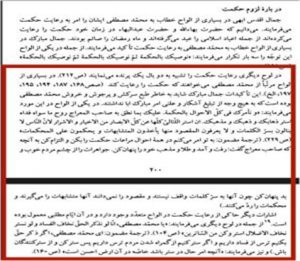
In other tablets, the observance of wisdom (taqiyya) is compared to the two wings of a bird (p. 212). In many of the tablets, Bahá’u’lláh repeatedly advises Muhammad Mustafa to practice wisdom. This emphasis from the Blessed Beauty (Bahá’u’lláh) was perhaps due to the rebellious and passionate nature of Muhammad Mustafa, who never hesitated to openly and publicly promote the Bahá’í Cause. In one of the tablets, He says in this regard:
“We command you in all circumstances to practice wisdom. Follow what the one who ascended to the heavens (Prophet Muhammad, may all souls be his sacrifice) has spoken: Conceal your travels, your gold, and your beliefs. Conceal all pearls from every eye, whether of the virtuous or the wicked, because people do not grasp the mystery of the words, nor do they understand their intended meaning. They take what is ambiguous and judge it against what is clear.”
Other references to practicing wisdom are found in numerous tablets, and in those times, this was a common practice. For instance, in another tablet, He says:
“O Muhammad Mustafa, if we mention the truth, we fear corruption; and if we conceal it, we fear leading people astray. Therefore, conceal, and be among those who conceal.”
He also states:
“Whatever pertains to the Cause, if it is concealed, particularly in that land, it is better.”
Key Points Derived from this Passage:
-
Synonymy of Wisdom and Dissimulation (Taqiyya):
“We command you in all circumstances to practice wisdom… Conceal your travels, your gold, and your beliefs.”
-
Command to Practice Taqiyya:
“O Muhammad Mustafa, if we mention the truth, we fear corruption; and if we conceal it, we fear leading people astray. Therefore, conceal, and be among those who conceal.”
-
Specific Command to Practice Taqiyya in Baghdad:
“Whatever pertains to the Cause, if it is concealed, particularly in that land, it is better.”
The fourth document
In a tablet addressed to Mulla Ali Bejestani; Order and creation, volume 3, page 116, practicing taqiyya is emphasized.
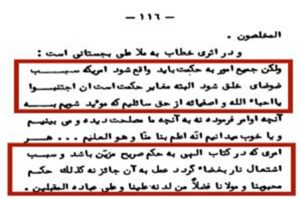
Here is the translation of the above tablet:
But all matters must be conducted with wisdom. Anything that causes turmoil among the people is certainly contrary to wisdom. O friends of God, avoid this. We ask God to help us follow what He has commanded, not what we see as beneficial or appropriate… Any matter that is clearly decreed in the divine book but causes the fire of enmity to ignite should not be carried out. Thus, our beloved Lord has decreed, as a favor from Him upon us and His devoted servants.
As is clearly evident, Bahá’u’lláh explicitly states that any matter that leads to chaos and hostility towards the Bahá’ís, even if it is one of God’s explicit commandments, should not be acted upon, as doing so would go against wisdom and is not permissible!Here, wisdom is again equated with concealment and discretion.
The fifth document
The following tablet was addressed to Zain al-Maqrabinin Order and Creation, volume 3, page 116.
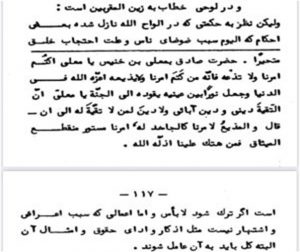
Here is the translation of the tablet:
And in a tablet addressed to Zayn al-Muqarrabīn, He says: ‘But in light of the wisdom that has been revealed in the tablets of God, some rulings that today cause unrest among the people and are the reason for the veil over them are perplexing. Imam Sadiq said to Mu‘alla ibn Khunays or Mu‘alla:Conceal our matter and do not disclose it, for whoever conceals our matter and does not reveal it, God will honor him in this world and place a light before his eyes guiding him to paradise. O Mu‘alla, Taqiyya (dissimulation) is my religion and the religion of my ancestors; there is no religion for one who does not practice Taqiyya. Then He said, Whoeverpublicly discloses our matter is like someone who denies it. Our matter is hidden, and the covenant with us is severed. Whoever exposes us will be humiliated by God.’
Here again, it is emphasized that acting on commandments that cause turmoil and trouble for the Bahá’ís, and lead to the people turning away from them, is contrary to wisdom and has been prohibited!
The sixth document
In Order and Creation, volume 3 page 118, Bahaullah reminds his followers of practicing taqiyya.
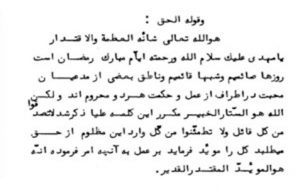
Here is the translation of the tablet:
O Mahdi, may God’s peace and mercy be upon you. These are the blessed days of Ramadan. During the days, we are fasting, and at night we are standing and speaking. Some who claim to love us are deprived of both action and wisdom. But God is the most concealing, the all-knowing. This supreme word has been repeatedly mentioned.”
In this tablet, it is also clear that:
- Firstly, Bahá’u’lláh Himself practiced taqiyya(dissimulation). Like Muslims, He would fast and, away from the eyes of enemies, engage in promoting His message at night!
- Secondly, Bahá’ís who outwardly claim to love Bahá’u’lláh but do not act with wisdom are merely claimants of love, not true lovers. This highlights the importance of observing wisdom (taqiyya)!
- Thirdly, God has concealed the actions of these claimants and protects them!
- The phrase “Do not believe every speaker and do not trust every newcomer” itself indicates the extent of Bahá’u’lláh’staqiyyaand concealment and how important it was to Him!
Section Two: Abdu’l-Bahá’s Instruction on Taqiyya
The first document
In a tablet addressed to Sheikh Farajullah Kurdi, found in Makátíb, Volume 3, page 325, ‘Abdu’l-Bahá instructs him to practice taqiyya!
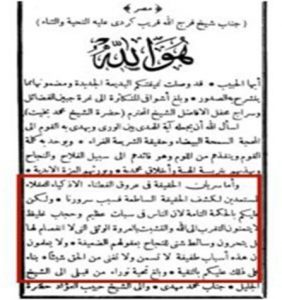
The translation of this section of the tablet is as follows:
“The flow of truth in the veins of intelligent and wise people, who have the capacity to uncover the truth, brings us satisfaction. But you must observe wisdom in all aspects because people are in a deep sleep and under a thick veil… Therefore, it is obligatory upon you to practice taqiyya!”
As can be seen, ‘Abdu’l-Bahá, like Bahá’u’lláh, equates wisdom with taqiyya.
The second document
In another tablet addressed to Farajullah Kurdi, found in Makátíb ‘Abdu’l-Bahá, Volume 3, page 326, ‘Abdu’l-Bahá says:
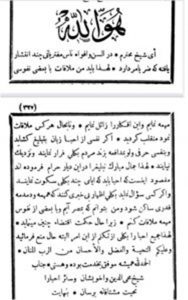
In this tablet, too, ‘Abdu’l-Bahá equates wisdom with concealment and denial:
“The intention is that the friends must remain completely silent for a few days, and if anyone asks, they should express total ignorance… because at this time, wisdom demands this. Therefore, instruct all the friends to absolutely refrain from speaking about this matter at this time.”
Section Three: Shoghi banns Taqiyya
In the section on the prohibition of dissimulation (taqiyya) within the “Treasury of Limits and Laws,” a letter from Shoghi Effendi forbidding taqiyya is included.
Chapter Seventy-Two: Prohibition Against Taqiyya (Dissimulation) and Concealing Beliefs
His Holiness, the Guardian of the Cause of God, may His Majesty be glorified, says in His most exalted words: (Extract from the Holy Tablet dated November 9, 1927)
“Some time ago, a telegram was sent from the Holy Land to that radiant assembly, emphasizing that regarding the civil records and the registration of religion and faith of the divine friends in all areas of that land, if they are compelled or obligated to state and record their religion, they should certainly not conceal it. They should not resort to pretension or hypocrisy. They should express their belief with full courage and clarity and should not fear or worry about the consequences and outcomes of stating the truth and revealing what is in their hearts.”
He also says: “Do not conceal your belief and avoid taqiyya (dissimulation). Come out from behind the veil of secrecy and step into the arena of service. Do not be anxious or fearful, and rise to the challenge with a willingness to sacrifice. Sacrifice anything for this primary goal, and for this noble Cause, give up any position or rank, and place personal interests and considerations aside for the sake of the general interests of the Cause. Wisdom and taqiyya in past times were the means of safeguarding and protecting the oppressed of that land and were the only means of preserving the religion of the Lord of the Universe. However, in these days, since the enemies of the Cause of God and the adversaries of the heavenly Faith have removed the veil of concealment from the face of the truths of the Cause, and they have fully revealed and publicized the essential beliefs of the people of Bahá, and they have confirmed the independence of the religion of Bahá’u’lláh, and through this, the Great Announcement has become known and famous throughout the regions of the world, taqiyya and concealing belief have become a cause of insult and disgrace, and in the eyes of the wise, they are unnecessary and harmful.”
As it is evident, these writings are addressed to a community that not only did not consider taqiyya reprehensible but practiced it quite naturally (according to the command of Bahá’u’lláh and `Abdu’l-Bahá). If it were otherwise, the issuance of such a decree would have had no meaning or purpose.
Especially noteworthy is the end of the second decree, where Shoghi Effendi, with the phrase “I urge you, O beloved friends… I ask you, dear ones of God, to make every effort to carry out this most difficult and dangerous task and remain steadfast in it…” urges the Bahá’ís to abandon the old tradition of taqiyya and to commit themselves to this most difficult and dangerous endeavor!
However, this request was not fully carried out, neither during Shoghi Effendi’s time nor after his passing. In situations where it was deemed in the interest of the Bahá’í administration, the tradition of taqiyya was still practiced, and it continues to be practiced today—a topic that requires further discussion.
As mentioned at the beginning of the article, the Bahá’í cult and its propagandists have attempted to distort history by presenting the Bahá’ís as always free from taqiyya. They support this claim by referencing the Bábí and Bahá’í martyrs, who courageously stepped onto the battlefield and achieved union with the Beloved. In contrast, they portray taqiyya as something specific to Shi’as, defining it as deceit, trickery, and hypocrisy.
However, if martyrdom is evidence of the absence of taqiyya, Shi’as have given thousands of martyrs throughout history!
The ignorance, fanaticism, and blind religious hatred in individuals like Nader Saeedi are so extreme that they write:
“In short, if the Bahá’í Faith were a political conspiracy for espionage in favor of foreigners, then Bahá’u’lláh, `Abdu’l-Bahá, Shoghi Effendi, and the Bahá’í Universal House of Justice would have always emphasized to the Bahá’ís that their religious duty was to practice taqiyya like the Shi’as, and they would have regarded the disclosure of their beliefs as a great sin. They would have also prevented any form of written documentation identifying the Bahá’ís…”(Nader Saeedi, Anti-Bahá’í Sentiment and the Accusation of Bahá’í Espionage)
In reality, however, the truth is something else. As stated, Bahá’u’lláh and `Abdu’l-Bahá both practiced taqiyya themselves and instructed their followers to do so, thereby unwittingly associating them with lying, hypocrisy, and espionage.
https://www.hassanershad.com/

